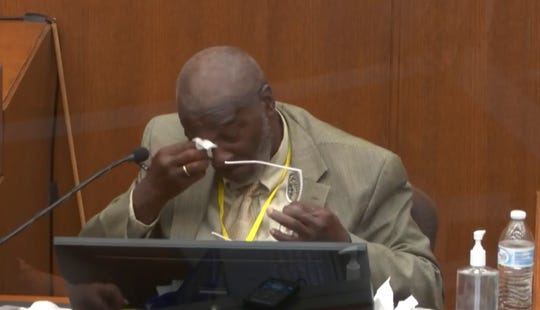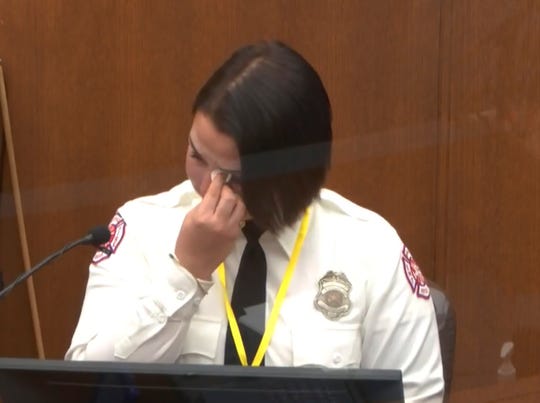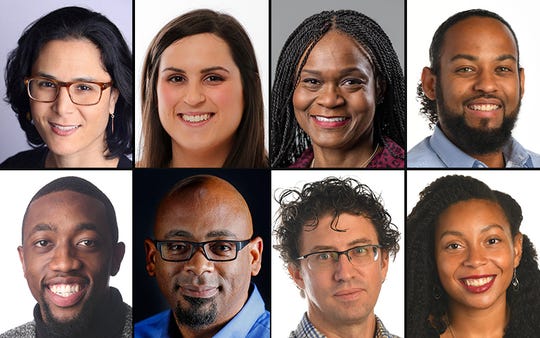The Backstory: Derek Chauvin trial, repeated showing of George Floyd video, traumatizes witnesses, community — and journalists
Witness Charles McMillian becomes emotional as he answers questions March 31 in the trial of former Minneapolis police officer Derek Chauvin at the Hennepin County Courthouse in Minneapolis. (Photo: AP)
I’m USA TODAY editor-in-chief Nicole Carroll, and this is The Backstory, insights into our biggest stories of the week. If you’d like to get The Backstory in your inbox every week, sign up here.
The trial of former Minneapolis police officer Derek Chauvin paused for 10 minutes Wednesday to give a witness time to compose himself. Charles McMillian was driving May 25 when he saw officers struggling with George Floyd by a blue Mercedes. He stopped and got out of his car to see what was going on, and became one of the earliest witnesses to the scene.
“I was looking away, then, when I turned back, I saw Mr. Floyd handcuffed. Then they started to walk him down the sidewalk,” McMillian said.
Soon Floyd was on the ground, Chauvin’s knee on his neck. In the court video, McMillian appeared to be about 10 to 12 feet away. He moved closer as Floyd called for his mother and yelled, “I can’t breathe.” On the stand, McMillian took off his glasses and wiped his eyes.
“Oh my God,” he said.
That’s when Judge Peter Cahill ordered a 10-minute recess. When court resumed, the video did, too, and two Black men on the jury were stone-faced. Rodney Floyd, George Floyd’s brother who was sitting in the courtroom, held his hands and looked down, shaking his head and refusing to watch. Chauvin wrote on a notepad, and then looked up at the video.
Videos of Floyd’s death are played regularly in court. Video from witnesses. Video from officers’ body cameras. Different angles. Different viewpoints.
“It’s really hard,” said national reporter N’dea Yancey-Bragg, in Minneapolis to cover the trial. “Even now, I’m sitting outside the (media) overflow room and I can hear the body camera footage, and it’s hard to watch it every single day from different angles.”
Particularly for those who saw it in person as well.
USA TODAY reporter N'dea Yancey-Bragg covers events surrounding the trial of former Minneapolis police officer Derek Chauvin. Chauvin has been charged with murder in the death of George Floyd. (Photo: Trevor Hughes, USA TODAY)
“What I took away most from the witness testimony so far was the deep sense of trauma that all these witnesses have experienced,” Yancey-Bragg said. “It’s hard enough for me just as a Black person to watch that all the time, but to have actually been there. I can’t even quite wrap my head around what that’s like, and then to have to come in and relive that moment in front of not just the court, but the world.”
Chauvin, a white man, is charged with second-degree murder, third-degree murder and second-degree manslaughter in the death of Floyd, a Black man.
As the prosecution makes its case, witnesses, one after another, take the stand. A 27-year-old firefighter on a walk. The teenager who shot the now-viral video. The cashier who reported the alleged counterfeit $20 bill that started the incident.
Genevieve Hansen, the firefighter, is heard on video begging officers to check Floyd’s pulse. “I could have given medical assistance, and that’s exactly what I should have done,” she said. “(But) the officers didn’t let me into the scene.”
“Were you frustrated?” prosecutor Matthew Frank asked.
“Yes,” Hansen said as she teared up. “I was desperate to help.”
Her testimony stood out to national editor Steve Myers.
“She’s not new to people being in medical distress, people dying, and she’s been in very stressful situations and this has stayed with her,” Myers said. “(There’s a) sense of guilt from people feeling like they could have done more. I mean, they were standing there. They were obviously not able to help. They would not have been allowed to, but they’re feeling very guilty.”
Minneapolis firefighter Genevieve Hansen testifies March 30 about witnessing the death of George Floyd and being prevented by police from helping him. (Photo: AP)
The entire city is traumatized, said national columnist Suzette Hackney. She and photojournalists Jarrad Henderson and Harrison Hill are embedded in the south Minneapolis community where Floyd died.
“It’s been traumatized since May,” Hackney said. “We’re hearing a lot of pain. We’re hearing a lot of frustration. I don’t think I’ve come across any person yet who thinks that Derek Chauvin is going to be convicted. They don’t believe in the system. So many people have said history has shown us that Black folks don’t get the justice.”
Henderson is sensitive to the fact that he’s recording “the first draft of history.”
“We won’t know how this will ultimately be in the books, but we know that there are real people, real families, real hopes and dreams that are going to be affected by this trial,” he said.
Hackney and Henderson are reporting from George Floyd Square, the intersection at 38th Street and Chicago Avenue. Neighbors and activists have blocked the area with concrete barricades and makeshift checkpoints since Floyd died in May. Residents and others can come in, but only after being cleared by volunteers stationed in weatherproof stalls.
When Hackney and Henderson first went into George Floyd Square, they put away their notebooks and cameras. They just talked to the neighbors before any reporting began.
They now come and go freely.
“There have been some (incidents) where media are feeling entitled, like, ‘We’re supposed to be here. We need to be here.’ And they really haven’t gone through the protocols, you know, to say, ‘What’s up?'” Henderson said. “You acknowledge people. You say, ‘Hello, good morning.’ You speak. And it makes you look less like somebody in there to do any harm.
“There are some people who come into these places and they have these trucks and they’re in people’s faces; the community just isn’t standing for it. They’re tired of being pimped out for the 6 o’clock news essentially.”
The work is tough on both of them.
“I’m struggling a bit,” Hackney said. “It’s difficult. I want to be here. I need to be here. I like to share other’s voices through my own. That’s very important to me.
“But I have to say, you know, watching opening statements and seeing that video again, it was re-traumatizing. Watching some of this testimony, it’s very traumatizing.”
USA TODAY video journalist Jarrad Henderson covers events surrounding the trial of former Minneapolis police officer Derek Chauvin. Chauvin has been charged with murder in the death of George Floyd. (Photo: Trevor Hughes, USA TODAY)
At USA TODAY, our mission is to cover the news and share the stories of those most impacted. We’re not interested in adding to the trauma.
Videos of Floyd’s death have been shown in court, and in the live video feed, up to seven times in one day. When one of those videos plays, we put up a graphic that simply says: “This portion is audio only while graphic images are shown in court.”
Of course, if there is a good reason to show it, if the news value outweighs the harm, we’ll remove the graphic. But, “to just see the video over and over is not adding much news value,” said USA TODAY standards editor Michael McCarter. “And it is also traumatizing.
“You see someone losing their life multiple times throughout this trial, which may be three or four weeks. How much is enough and how much is too much?”
We’ll keep an eye on our team as well.
We’ve written about the trauma to witnesses, area teenagers and the city, said breaking news editor Rachel Aretakis.
“It’s going to take its toll,” she said. “Certainly on people covering it as well.”
Criminal justice reporter Tami Abdollah is part of the team following the trial daily. “I wasn’t sleeping well at all for the first couple of days,” she said. “I finally forced myself to get, you know, some continuous sleep, so I could focus and get my brain right.
“It’s probably one of the most intense trials I’ve dealt with, and I’ve dealt with a lot of the higher-profile ones. But this one’s really intense.
“Everything is a lot more.”
From top left, USA TODAY's Tami Abdollah, Rachel Aretakis, Suzette Hackney, Jarrad Henderson, Harrison Hill, Michael McCarter, Steve Myers and N'dea Yancey-Bragg. (Photo: USA TODAY)
Stay updated on the Derek Chauvin trial: Sign up for text messages of key updates, follow USA TODAY Network reporters on Twitter, or subscribe to the Daily Briefing newsletter.
The Backstory: When women are pushed out of workforce, it impacts far more than just the women themselves
The Backstory: In Georgia, murders, misogyny and racism intertwined tragically
Nicole Carroll is the editor-in-chief of USA TODAY. Reach her at [email protected] or follow her on Twitter here. Thank you for supporting our journalism. You can subscribe to our print edition, ad-free experience or electronic newspaper replica here.
Source: Read Full Article


